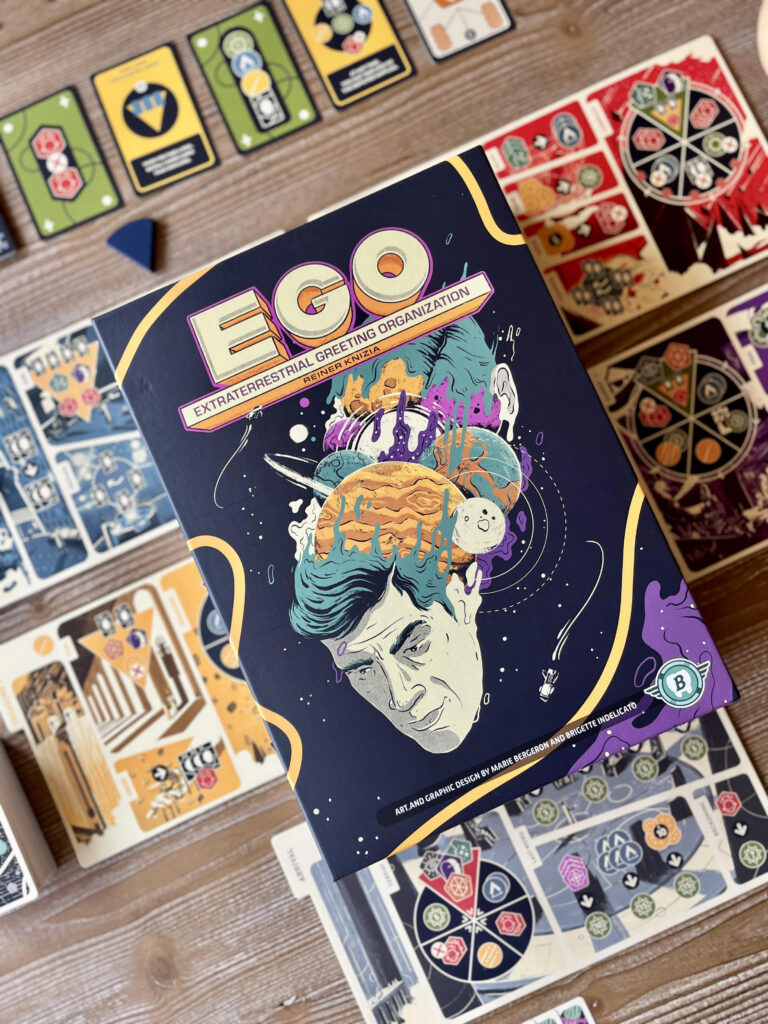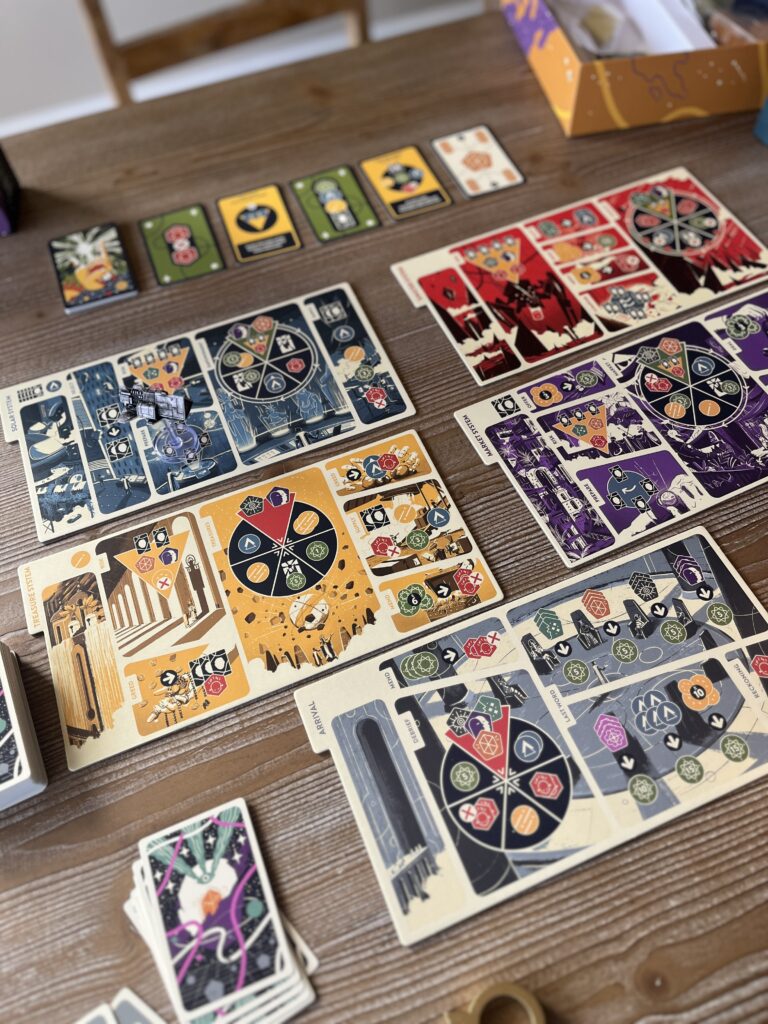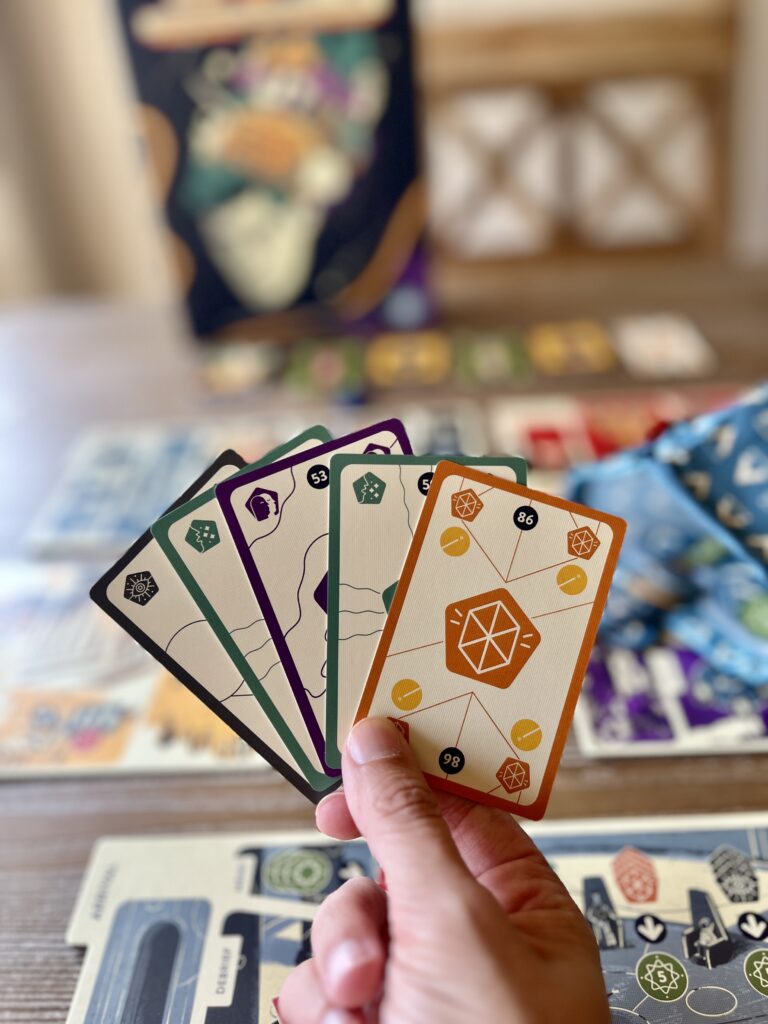Well I can’t really start a review of a game named after one of Sigmund Freud’s most famous concepts, without stating that I am really not Freud’s biggest fan. No, this isn’t just transference, and no, he doesn’t remind me at all of my father. He probably is maligned and misinterpreted to an unfair degree, but at the end of the day we just don’t see eye to eye on many things. I AM, however, one of Knizia’s biggest fans. So I guess we’re net neutral there.
Ego is the second game in the Orbital Silos trilogy, and while it’s got a fun tongue-in-cheek theme to it, I don’t really see the Freudian connection. I assume it’s Freud (and not just “ego” as in “arrogance”, although it’s that too), since the expansion is literally titled Id. But Freud’s “ego” is not our everyday understanding of ego, and if there’s a deeper connection here, I’m missing it. This is probably a stupid thing to focus on, but I’ve been sitting here for the better part of an hour trying to understand the connection, and my little pea brain just isn’t seeing it.

Anyway, what I do see is a theme that, while it could have been a lot of things (this started life as Beowulf, after all), works quite well here. This is still a working theory in my mind, but Knizia games often give me the sense that the theme is kind of beside the point. I can take or leave a sci-fi theme. And yet, I think that’s why they click for me more than story-heavy, world-building games. In those, the story and characters often feel bolted on to the mechanics. In Knizia games, we are the characters. The players are the game. At least for the average Knizia-weight game, that requires a certain genericness, but it also makes the whole thing more flexible and universal.
The elevator pitch is that we have recently discovered proof of advanced civilizations and have pooled our resources with other human-populated Milky Way planets (Mars, Venus, etc) to build a Super Ship, which, of course, we all have to ride together in (bastards). However, we are seeking to gain allies that will benefit our home planet the most, without offending our new friends. That’s the idea anyway. This is played out through a sequence of auctions, drafts, and risks in a way that actually does manage to pull off the art of the deal pretty well.
One might say society and humanity advance at the pace of their greatest leaders’ greatest words. Kennedy called for the moon, and we went. Churchill promised nothing but “blood, toil, tears, and sweat,” and Britain steeled itself for the fight. And my generation’s poet laureate, Lil Wayne, once proclaimed: “Real G’s move in silence like lasagna.” And so, naturally, a great hush fell over the land.
The point being: when words are forceful enough, they can become prophecy…or at least they rewrite the story after the fact. Ego taps into that same current, but unfortunately, it made it abundantly clear I’m in the Lil Wayne category, rather than the Churchill, based on my scores. Sorry folks, but looks like the aliens aren’t going to be our friends any time soon.
Right. Onto the details. The boards look busy at first, but the iconography is clear after half a game. Your ship will pause on each section of the board and resolve the event. Most of these are quick, allowing you to exchange resources or take new ones.

There are also Risk Events which give each player an opportunity to gain more cards, with the risk of taking an Offense token (potential lost end-game points) if you get a poor outcome. Essentially, you flip over a specified number of cards, aiming to flip only the card suits indicated. All matches = total success, no matches = failure but no penalty, some matches = partial reward plus penalties. That structure keeps total failures from being devastating, and since most players end up with partial successes, everyone eats penalties together. Still, there’s always a chance you win it big. Better than a gambling app, at least!
The biggest showdowns are the Negotiation and Bidding Events. Negotiation is tense, turn-by-turn card play. You need to match or raise the last player’s bid with a card or several, or bow out and claim the worst Priority Token, leaving you last to choose your reward. The winner becomes Mission Leader (aka first player), with first choice of rewards. Bidding works similarly but is streamlined. Everyone secretly commits cards at once, then reveals simultaneously to determine turn order and rewards.
I love auction mechanics because they cut straight to valuation. All games ask us to decide what something is worth, but auctions make it explicit and they let the players decide that, not the designer. Many Euros have a “right answer” baked in, but an auction game forces you to define the answer. That’s Knizia’s magic. His games always play the players. There’s always a little metagame humming underneath, and that’s his hallmark.
Now, one thing you wouldn’t expect is for an auction game to play well at two players. Inevitably, yeah, it is more fun at the higher player counts, but I just want to note I fully enjoyed myself at two. The rewards in the two player game are almost always a good and a bad reward, forcing you to duke it out with each other. But at the same time, you can’t fully commit all your resources to every auction, so you need to decide which are most important for you to win. It’s simple and it works well.
But, dare I talk about auctions too much and give you the wrong idea, the vast majority of this game is based around push-your-luck. And this is where it’ll get divisive. If you aren’t bothered by luck in games too much, you’ll probably enjoy this. If you are, stay away. Almost every action revolves around pushing your luck, with the most common being deck draws.

As far as the Id expansion goes, this actually feels pretty unnecessary to me, unless you absolutely love the game and play it a ton. It basically adds one more risk event at the end of each civilization board. It’s more variety that I wasn’t necessarily looking for (after 5 games at least). The base game, especially with the board extension options and modularity, is plenty for us. And the additional Alliance tokens made it a touch too swingy.
But ultimately, Ego is just a really solid, goofy game. For instance, in one game I saw that none of the upcoming events matched the suits left in my hand, so I shoved everything I had into a negotiation instead of saving them for end-game points. Well, folks, I still lost the negotiation… and the game, 46–59.
And this circles back to what makes Knizia games so fun and brilliant. Beyond the slightly generic themes, there’s this feeling of freedom. Not the “I can do literally anything” kind of freedom, which is overwhelming more than exciting, but freedom inside a framework. I wrote a bit about this in my Arcs review, and I keep coming back to it because it helps me understand what games I will love vs like. Knizia gives us the bumpers that make wide open spaces playable. In Ego, the freedom isn’t some abstract idea. It comes through how we approach those negotiations. It’s a freedom that only exists because the rules make room for it.
And maybe, in a roundabout way, that’s the real Freudian connection. Freud’s ego wasn’t about arrogance. It was about balancing the chaos of desire with the stiff demands of order. In Ego, you get the same thing… chaos and structure. Knizia gives you just enough of a frame to keep you from falling apart, and then hands you the freedom to let you fall apart on your own anyways. And that’s the fun of it!
Huh, now that I’m at the end of this review, I guess the Freud connection does kind of make sense.
Thank you to Bitewing Games for the review copy